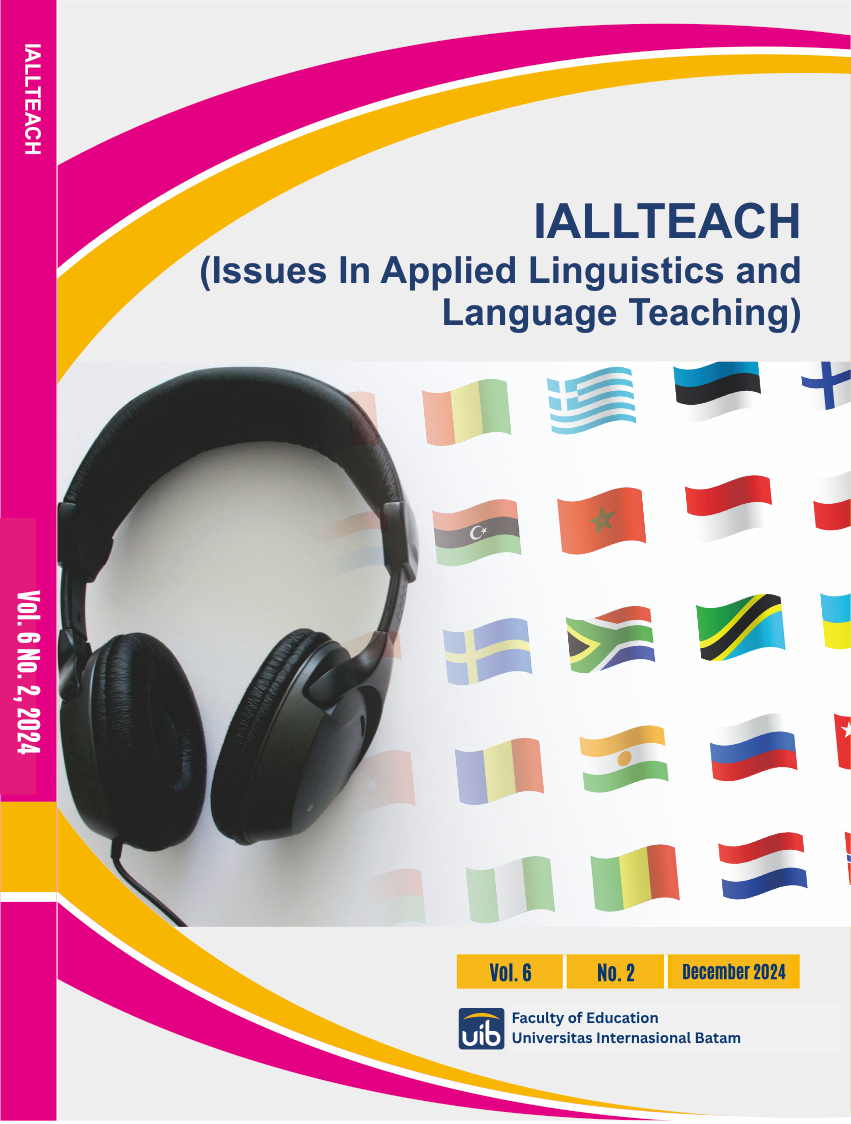Socio-Cultural Factors Influencing Primary Graders’ Ability in English Skills
DOI:
https://doi.org/10.37253/iallteach.v6i2.9859Keywords:
Sociocultural, Primary Graders, English SkillsAbstract
This research investigated sociocultural factors' influence on language learners' abilities, specifically in the context of English education in Indonesia. The various social backgrounds of Indonesians posed difficulties in English instruction due to differences in communication standards. The research aimed to determine social and cultural factors that impacted the English language skills of primary-grade students by providing insights into the educational context at SD Smart School Jakarta. It employed a descriptive qualitative technique within a case study research design. The research comprised two English teachers and grades 5 consisting of 56 students. Through data analysis and engaging in conversations, the study highlighted the crucial significance of motivation in overcoming obstacles in both speaking and writing. An inclusive English learning environment incorporating various methodologies was advantageous for students. Moreover, the active participation of parents was identified as a crucial element in improving the English language skills of elementary school students. The results emphasized the importance of motivation, a favorable learning environment, and parental assistance in acquiring English language proficiency.
Downloads
References
Azzizah, Y. (2015). Socio-Economic Factors on Indonesia Education Disparity. International Education Studies, 8(12), 218. https://doi.org/10.5539/ies.v8n12p218
Bryman, A. (2016). Social research methods. Oxford University Press.
Butina, M. (2015). NO 3 SUMMER 2015 CLINICAL LABORATORY SCIENCE 190. In Clin Lab Sci (Vol. 28, Issue 3). http://hwmaint.clsjournal.ascls.org/
Creswell, J. W., & Poth, C. N. (2018). Qualitative inquiry and research design: Choosing among five approaches. Sage Publications.
Kakita, R., & Palukuri, V. B. (2020). Social and Cultural Factors Influence on English Speaking Abilities (pp. 133–141). https://doi.org/10.4018/978-1-7998-3464-9.ch016
Marshall, C., & Rossman, G. (2016). Designing qualitative research. Sage Publications.
Merriam, S. B. (2009). Qualitative research: A guide to design and implementation. Jossey-Bass.
Njuguna, N. R. (2021). The Socio-cultural Factors that Influence Academic Performance of Public Primary Schools in Murang’a South Sub County, Kenya. Journal of Education, 28–42. https://doi.org/10.53819/81018102t3015
Ozfidan, B., L., K., & Demir, H. (2014). Socio-cultural Factors in Second Language Learning: A Case Study of Adventurous Adult Language Learners. European Journal of Educational Research, 3(4), 185–191. https://doi.org/10.12973/eu-jer.3.4.185
Poedjiastutie, D., Mayaputri, V., & Arifani, Y. (2021). Socio-cultural challenges of english teaching in remote areas of Indonesia. Teflin Journal, 32(1), 97–116. https://doi.org/10.15639/teflinjournal.v32i1/97-116
Vázquez-Cano, E., De la Calle-Cabrera, A. M., Hervás-Gómez, C., & López-Meneses, E. (2020). Socio-family context and its influence on students’ pisa reading performance scores: Evidence from three countries in three continents. Educational Sciences: Theory and Practice, 20(2), 50–62. https://doi.org/10.12738/jestp.2020.2.004
Yin, R. K. (2017). Case study research and applications: Design and methods. Sage Publications.




.png)






